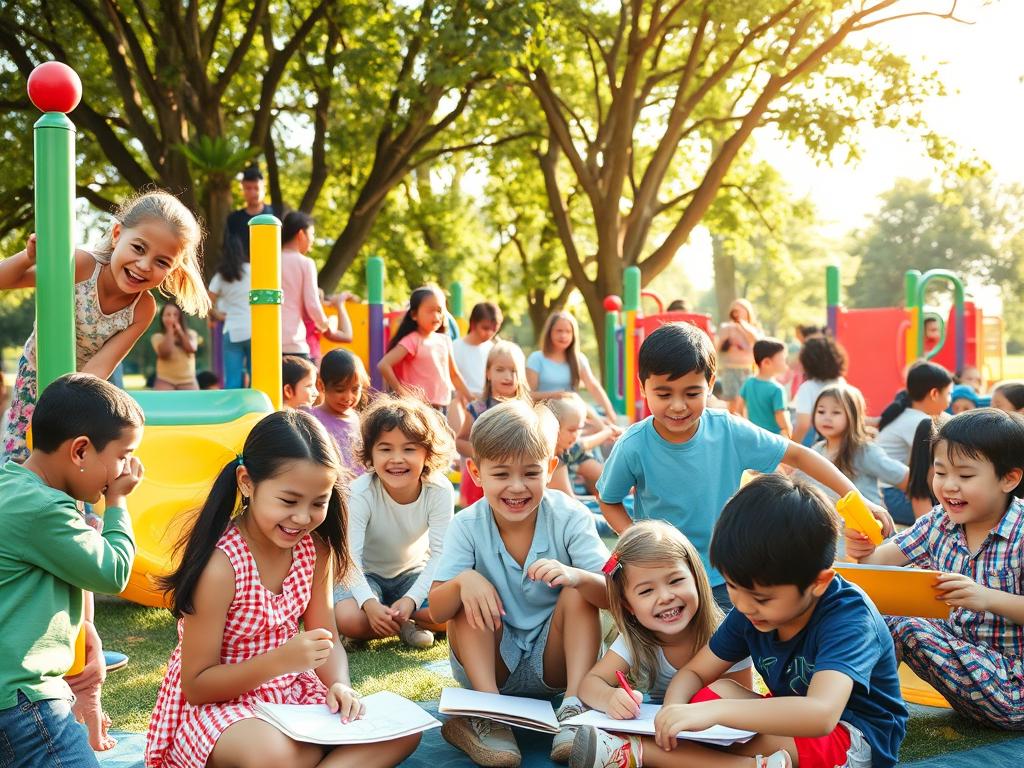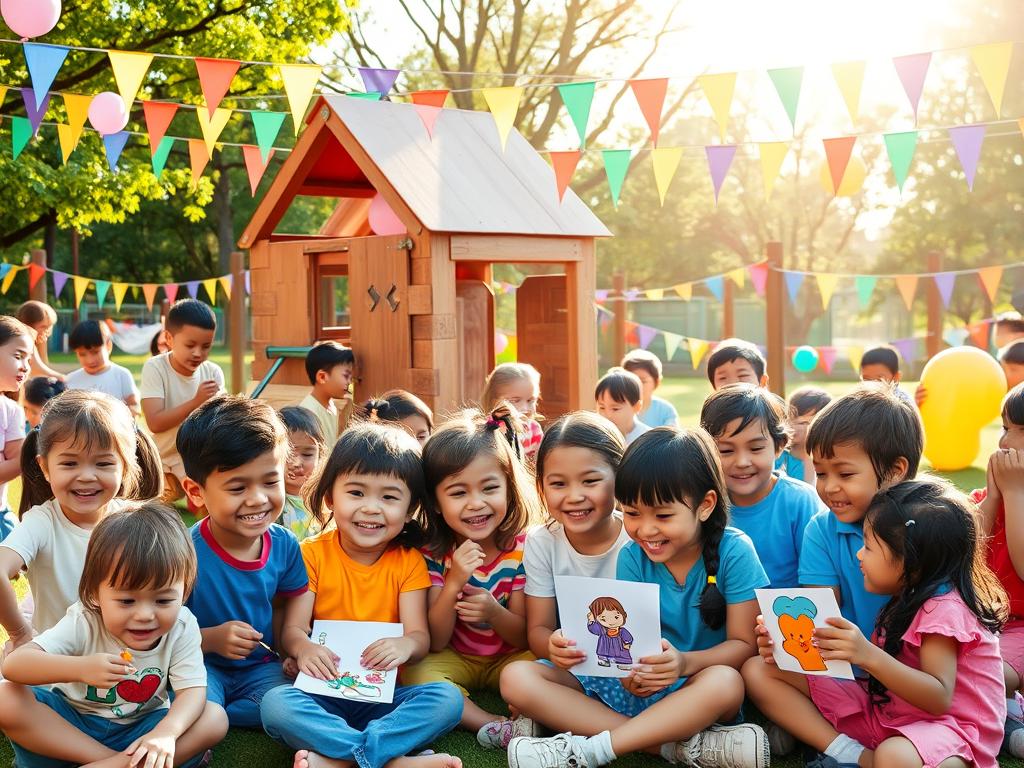Every parent knows that watching our children grow comes with its unique challenges, but aiding them in developing a strong sense of self-worth is among the most vital gifts we can give them. Self-esteem is the foundation upon which children build their thoughts, feelings, and behaviors. Children with high self-esteem feel confident in their abilities, enabling them to navigate life’s ups and downs with resilience. However, in today’s fast-paced world, many children face hurdles that can shatter their self-image, making it all the more essential to celebrate their accomplishments and encourage their strengths. Through creative and engaging activities, we can help our kids not only appreciate their worth but thrive in their interpersonal connections and decision-making skills.
Our upcoming list of 30 Fun Self-Esteem Games for Kids will showcase a variety of confidence-building activities that can be easily integrated into daily life. From supportive games focused on teamwork to interactive activities that cultivate self-reflection, these self-esteem games are designed to uplift and empower. So, let’s embark on this journey together, creating opportunities for fun while nurturing the confidence your child needs for a brighter future. For more insights on fostering essential life skills in children, you can explore key strategies here.
Key Takeaways
- Self-esteem plays a crucial role in children’s overall development and impacts their decisions.
- High self-esteem leads to healthier relationships and greater achievement.
- Encouraging children to focus on their strengths is key to boosting confidence.
- Celebrating small victories and setting achievable goals enhances self-worth.
- Engaging in fun activities can effectively improve self-esteem.
Why Self-Esteem is Important for Kids
Understanding self-esteem is pivotal for fostering children’s emotional health and overall well-being. Self-esteem affects nearly every aspect of child development, including social interactions, academic performance, and personal growth. A child with high self-esteem is often more resilient and better equipped to handle challenges that arise, as they tend to approach situations with confidence and a positive mindset.
Understanding Self-Esteem
Self-esteem entails how children perceive their own worth and abilities. High self-esteem allows them to feel secure in their interactions and decisions, fostering a sense of emotional resilience. Conversely, children with low self-esteem can struggle with negative self-talk and fear of failure. Engaging in activities that promote self-esteem, such as household chores, can significantly impact their sense of purpose and capability. Involving children in simple tasks can nurture awareness in, shaping their self-worth from an early age.
Signs of Healthy vs. Unhealthy Self-Esteem
Recognizing signs of low self-esteem is crucial for early intervention. Children exhibiting healthy self-esteem are likely to be confident, willing to share and express themselves, and eager to engage in new activities. In contrast, those with unhealthy self-esteem may show reluctance to try new experiences, engage in negative self-talk, and prefer social isolation. Identifying self-esteem levels can empower parents and educators to provide necessary support, ultimately fostering a nurturing environment that bolsters children’s confidence and emotional resilience.

| Signs of Healthy Self-Esteem | Signs of Low Self-Esteem |
|---|---|
| Willing to try new things | Avoids new experiences |
| Confidence in abilities | Excessive seeking of approval |
| Strong social interactions | Social isolation |
| Accepts failures as learning opportunities | Difficulty handling challenges |
| Engages in positive self-talk | Frequent negative self-talk |
Boosting self-esteem can be a life-altering endeavor for children. Fostering a strong sense of self-worth builds a foundation for success in relationships, academics, and ultimately, their future. Engaging in family activities that promote bonding and self-worth, such as cooking together or reflections during mealtime, can create lasting benefits and a healthier emotional outlook.
These strategies not only enhance their self-esteem but also pave the way for long-term emotional resilience as they navigate through various life stages.
Overview of Fun Games to Boost Confidence
Engaging children in interactive self-esteem games presents an effective avenue to foster their confidence and emotional growth. Through the benefits of play, kids gain opportunities to explore their interests, test their skills, and build meaningful connections with their peers. These experiences not only spark joy but also aid in developing vital social and emotional competencies.
Benefits of Play for Self-Esteem
The importance of play extends beyond entertainment; it functions as a foundation for self-esteem activities. Children often express their identities and learn crucial life lessons through play. Activities such as choosing a weekly chore or packing a suitcase for a trip instill a sense of capability. Furthermore, children can develop a more profound recognition of their strengths by crafting a “What I’m Proud of” list. These simple, fun tasks enhance their sense of worth and encourage positive self-reflections.
How Games Help Build Confidence
Confidence-building games provide immersive environments where children can practice teamwork and communication. Such games help them navigate successes and setbacks, which are essential for resilience. Specific self-esteem activities at engaging locations, like Woodloch Resort, encourage children to earn medals through various group activities, solidifying their self-worth in a fun way. Interactive self-esteem games create collaborative settings to develop peer relationships, leading to greater confidence as children navigate their interactions.

Incorporating play-based learning dramatically impacts children’s self-esteem, setting the stage for healthier futures. As children experience a boost in confidence, they become more adept at handling peer pressure and fostering positive relationships. Games designed for boosting self-esteem serve as powerful tools to cultivate a nurturing journey towards greater self-assurance and personal growth. For more insights on effective strategies to enhance listening skills and reinforce self-esteem, check out this helpful resource.
Creative Activities for Building Self-Worth
Engaging in creative activities fosters self-worth and enhances children’s self-esteem. These activities serve as effective self-esteem building exercises, allowing kids to explore their identity and express themselves. Incorporating art and storytelling into their routines helps kids internalize positive notions about themselves.
Collage of Achievements
A collage of achievements is a vibrant way for children to visually represent their successes and strengths. Through collage projects, kids can combine images, words, and symbols that resonate with their accomplishments. This activity not only boosts creativity and self-worth but also helps children recognize their strengths, reinforcing a positive self-image over time. Such self-worth activities are vital for nurturing a child’s sense of value and can be a fun addition to any educational setting.
Affirmation Art
Affirmation art enables children to create pieces that reflect positive affirmations about themselves. This artistic expression is integral to self-esteem building. When children regularly engage with affirmation activities, they can internalize empowering messages, creating a robust framework for their self-esteem. Art for self-esteem becomes a powerful tool, encouraging imaginative play and instilling a sense of pride in their abilities.
Confidence Storytellers
The Confidence Storytellers activity involves children sharing personal stories that highlight their strengths and experiences of overcoming challenges. This form of storytelling activities fosters confidence through narratives, allowing kids to articulate their feelings and share meaningful experiences in a supportive environment. Narratives play a significant role in building identity, leading to greater self-acceptance and awareness of their worth in the community.

| Creative Activity | Benefits | Materials Needed |
|---|---|---|
| Collage of Achievements | Enhances recognition of strengths | Magazines, scissors, glue, paper |
| Affirmation Art | Builds pride and positive self-talk | Art supplies, canvas, markers |
| Confidence Storytellers | Fosters identity and community | Story prompts, comfortable space |
These creative activities provide unique avenues for building self-worth. For further insights on promoting positive self-esteem, consider exploring practical resources like suggested activities for family engagement that align well with emotional development.
Interactive Games that Encourage Teamwork
Engaging in interactive self-esteem games can greatly enhance children’s teamwork skills while fostering their confidence. These activities create opportunities for kids to connect with each other, building trust and boosting their self-esteem in a fun and supportive environment.
Trust Building Circle
The Trust Building Circle is one of the most effective trust games. This activity promotes cooperation, as children take turns sharing experiences or feelings while others listen attentively. Through consistent engagement in these teamwork activities, children develop mutual respect and understanding, which boosts their self-esteem. This circle allows them to recognize the importance of relying on peers, further enhancing their connections.
Compliment Relay
In the Compliment Relay game, children practice giving and receiving positive affirmations in play. Participants take turns complimenting each other, creating a positive atmosphere. This interactive game encourages kids to engage in compliment games, fostering an environment where everyone feels valued. Through boosting self-esteem through compliments, children learn to both appreciate themselves and recognize the worth of their peers.
| Activity | Type | Key Focus | Teamwork Skill Developed |
|---|---|---|---|
| Trust Building Circle | Trust Game | Active Listening | Mutual Understanding |
| Compliment Relay | Compliment Game | Positive Reinforcement | Building Self-Worth |
| Seeing Spots | Non-Physical | Non-Verbal Communication | Collaboration |
| Balloon Battle | Physical | Creative Thinking | Team Strategy |
For more ideas on how to create lasting family connections through teamwork, consider exploring ways to enhance positive communication among children and parents through enjoyable activities. You can find valuable insights by clicking on this link about strengthening family bonds.
Reflection Activities to Enhance Self-Recognition
Incorporating reflection activities into children’s routines can significantly boost self-recognition and self-esteem. Engaging in tangible experiences fosters emotional growth and enhances self-awareness. Three impactful activities include positive journaling, feelings charades, and self-portrait reflections. Each of these activities encourages kids to explore their emotions and recognize their unique qualities, laying the foundation for improved emotional intelligence.
Positive Journaling
Positive journaling serves as an excellent tool for children aiming to enhance their self-esteem. By regularly documenting experiences and accomplishments, children engage in reflective writing activities that promote self-awareness. This practice allows them to identify patterns in their feelings and develop a more positive mindset. By combating negative self-talk, kids strengthen their emotional resilience, leading to overall healthier self-esteem.
Feelings Charades
Feelings charades is not just a fun game but also a valuable method for emotional expression. Engaging in charades for kids helps them articulate and act out various emotions, enhancing their emotional vocabulary and empathy towards others. These emotional expression games significantly contribute to improving emotional intelligence, equipping children with valuable skills for understanding both themselves and their peers.
Self-Portrait Reflections
Self-portrait activities allow children to artistically explore their identity. Creating a self-portrait encourages self-reflection through art and provides a visual representation of how they see themselves. Discussing these portraits with family members or peers bolsters their self-worth and appreciation for individual traits. In a world where art and self-esteem often intertwine, this creativity fosters deeper emotional connections and promotes self-acceptance.
Parents can visit this link for further insights on supporting children’s emotional journeys through travel experiences. Exploring diverse cultures contributes to enhancing self-awareness, demonstrating the significance of stepping beyond comfort zones.
Group Games to Foster Supportive Environments
Creating a nurturing atmosphere for children is essential in building their self-esteem. Engaging them in group games fosters supportive relationships and encourages personal growth. Through activities like Kindness Bingo and Encouragement Hot Potato, kids learn the value of mutual support, boosting their confidence in a collaborative setting.
Kindness Bingo
Kindness Bingo is an engaging game that promotes kindness activities among children. Players complete acts of kindness, such as helping a friend or sharing a toy, marking these on their bingo cards. This interactive approach not only reinforces the impact of positive behaviors but also promotes teamwork. As kids participate in this game, they foster a sense of community, which is integral in fostering a positive environment and nurturing self-esteem.
Encouragement Hot Potato
In Encouragement Hot Potato, children pass a soft object while sharing compliments and words of encouragement. This dynamic game works well as an encouragement game, emphasizing the importance of positive feedback. The lively nature of this activity cultivates a tight-knit atmosphere, reinforcing that support from peers is vital for personal growth. Through these group activities, children practice the art of uplifting one another, thereby promoting positivity among kids. For more insights on creating such engaging environments, check out the 30 Fun Self-Esteem Games for Kids to Boost.
Tips for Parents and Educators on Game Facilitation
Creating an empowering environment is essential for facilitating self-esteem games. A safe environment for kids helps them feel secure, which is crucial for engagement. Parents and educators should emphasize open communication, ensuring that each child’s voice is heard and valued. This approach not only reduces anxiety but also fosters an atmosphere conducive to inclusive play, allowing children to explore their feelings without judgment.
Creating a Safe Space for Participation
In nurturing spaces, children thrive by taking risks and trying new things. Positive reinforcement strategies should be at the forefront, focusing on what children do well rather than on mistakes. Encouraging feedback for kids that highlights their strengths reinforces their ability to tackle future challenges, ultimately enhancing self-esteem through validation.
Encouraging Positive Feedback
Moreover, implementing a follow-up discussion after games can greatly enhance the lessons learned. Post-game reflection allows children to contemplate their experiences, recognizing both successes and opportunities for growth. This reflection solidifies the benefits of engaging in self-esteem boosting games by helping children connect their feelings to real-life experiences and reinforcing lessons learned through play.
Following Up After Games
To further support children’s development, it’s beneficial to integrate games into everyday life. This can be as simple as scheduling regular playtimes that cater to nurturing attachment. Parents can also explore resources for planning these activities effectively, such as smart packing ideas when traveling or organizing family outings. By actively participating and adapting games to suit individual needs, adults can build deep trust and enhance children’s sense of safety, paving the way for ongoing self-confidence and joy.










